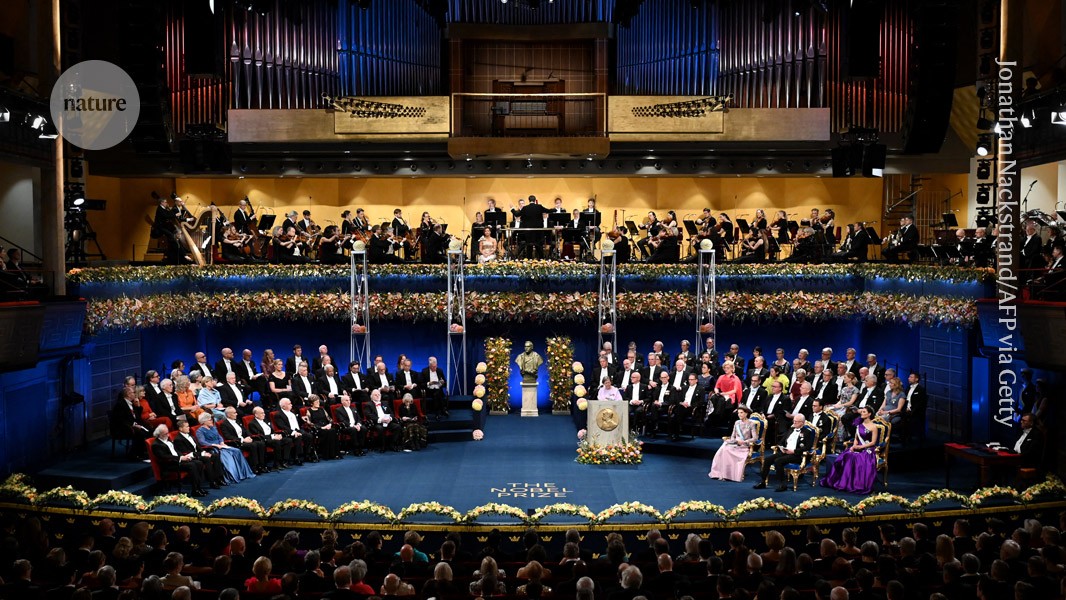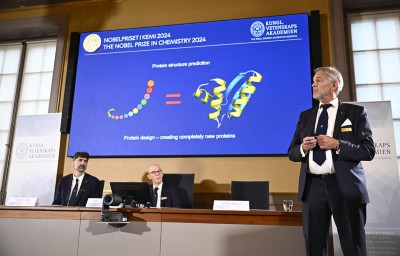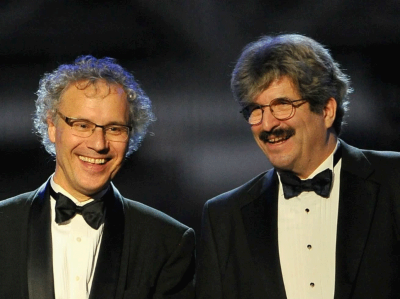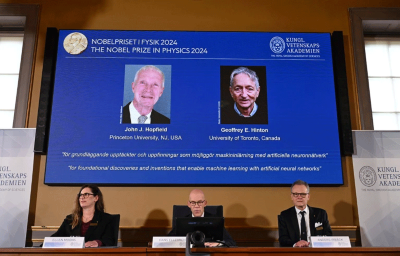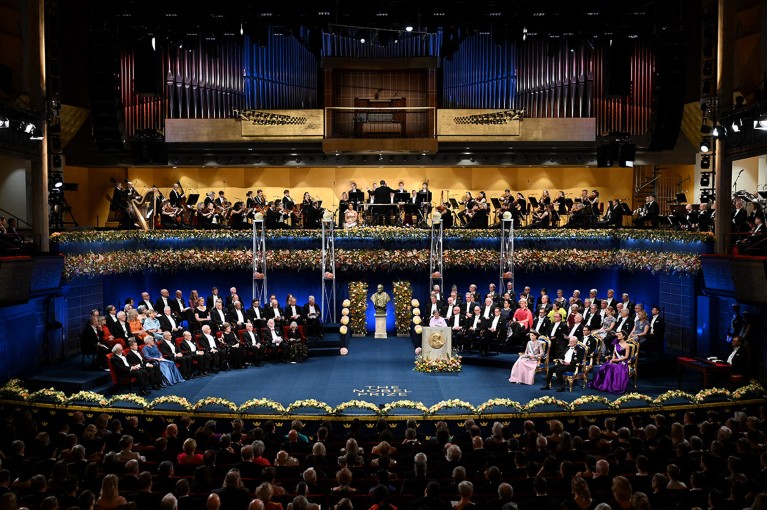
Members of the Swedish royal family join laureates on stage at the 2023 Nobel awards ceremony.Credit: Jonathan Nackstrand/AFP via Getty
Nobel prize season is always a time of excitement and speculation about potential winners, but it also brings criticism about the constraints imposed by the rules for the world’s most prestigious scientific prizes. Is it, after all, realistic to expect the stipulations specified by Alfred Nobel 129 years ago to remain appropriate for science today?
AI comes to the Nobels: double win sparks debate about scientific fields
Although there is no shortage of scientific prizes, some of which (such as the US$3-million Breakthrough prizes) are more financially rewarding than the Nobels, none are yet afforded the same cultural status and prestige. So, if the Nobels were being launched today, would their formula need to be different?
“Personally I would say the criteria for Nobel prizes would not have to be significantly modified, but remain effective in the way Alfred Nobel intended”, says chemist Bengt Nordén at Chalmers University of Technology in Gothenburg, Sweden, who was chair of the chemistry Nobel Committee for three years.
One obvious question is whether the categories of the awards adequately cover the core of scientific research. The Nobels are assigned loosely to the classical natural-sciences triumvirate of physics, chemistry and biology. But there is clearly some latitude in those boundaries. The physics awards have reached into fields including nonlinear dynamics and astronomy. The chemistry prizes, meanwhile, have ventured into Earth sciences, such as the 1995 prize for work on the ozone layer and atmospheric chemistry. This year’s chemistry and physics prizes both centred on artificial intelligence (AI).
Lack of maths
Göran Hansson, a physician at the Karolinska Institute in Stockholm and former vice-chair of the Nobel Foundation, argues that Nobel’s archaic-sounding category of physiology or medicine remains more apt than a broader biology or life sciences, because these awards remain focused on either clinical medicine or biology relevant to humans (including, in 2022, human evolution).
Medicine Nobel awarded for gene-regulating ‘microRNAs’
Hansson points out that mathematics, which does not have a Nobel category, is well served by other awards, such as the Wolf Prize and the Fields Medal. But there is nothing, he says, to prevent a funder from proposing a new category that could be administered by the Nobel Foundation, as happened for the Nobel prize in economic science — which is awarded in memory of Alfred Nobel — launched by Sweden’s central bank Sveriges Riksbank in 1969.
Newer high-profile science prizes fill some of these gaps while leaving others open. For example, the $1-million Kavli prizes were launched in 2005 by the foundation established by entrepreneur Fred Kavli and are administered by the Norwegian Academy of Science and Letters in Oslo. The prizes reward research in astrophysics, nanoscience and neuroscience — which Kavli thought were “the most exciting fields for the twenty-first century and beyond”. The Breakthrough prizes, founded by a group of technology entrepreneurs, including Yuri Milner and Mark Zuckerberg, give annual awards in fundamental physics, life sciences and mathematics.
Perhaps the biggest source of controversy for the Nobel prizes is the restriction of three winners per category. Some argue that this doesn’t reflect the way science has become highly collaborative since Nobel’s day. But Hansson defends the constraint. “Three is, needless to say, not a holy number. But there has to be a limit. And it forces us to work even harder to identify the true discoverers.”
Where does a team end?
Prestigious awards “make researchers and research visible, shape careers and even create role models”, says historian Nils Hansson at the Heinrich Heine University Düsseldorf in Germany. He feels such recognition for individual researchers can be positive for science, and doubts that such benefits would follow if prizes were awarded to teams. Besides, he asks, “where does an interdisciplinary and international team start and where does it end?”
Nordén argues that opening up the prize to big teams “would dilute the impact”. However, Göran Hansson acknowledges that big science, especially particle physics, “is a special case” that complicates the picture. The Breakthrough prizes have no limit on awardees: the 2016 prize in physics for the experimental detection of gravitational waves went to 1,015 recipients.
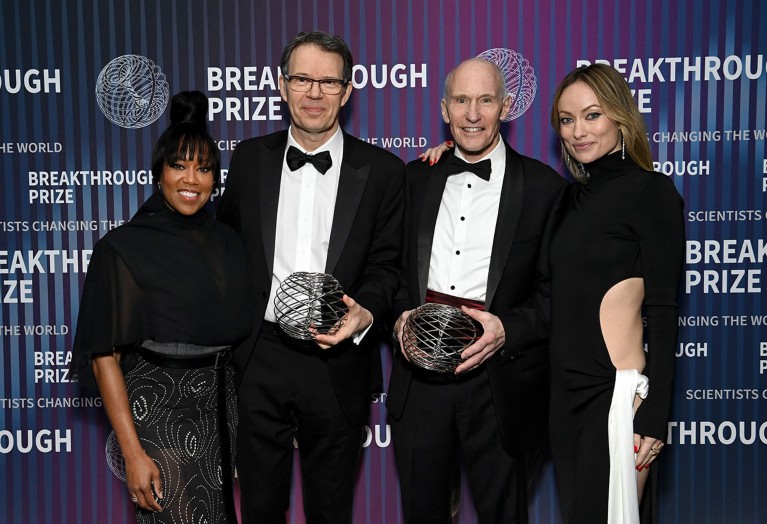
The Breakthrough prizes are sometimes regarded as the ‘Oscars of science’, complete with a star-studded Hollywood ceremony.Credit: Jon Kopaloff/Getty Images for Breakthrough Prize
It would surely be hard for any new prize to compete in prestige with the historical legacy of the Nobels, winners of which include Marie Curie, Albert Einstein, Werner Heisenberg, James Watson, Francis Crick, Frederick Sanger and Sydney Brenner. “The past laureates chosen can give added prestige to a prize,” says Lise Øvreås, president of the Norwegian Academy of Science and Letters, and a microbiologist at the University of Bergen in Norway.
Does the financial worth of a prize make a difference? A small survey of physicians and medical researchers conducted by Nils Hansson1 indicated that scientists feel that media attention can boost an award’s prestige.
Milner says that the substantial financial value of the Breakthrough prizes was intended as “a message to the world: why should basketball players be paid millions and not scientists?” Academic and professional prizes are all well and good, he says, but “we really want the public at large to understand that scientists should be celebrated on a par with actors and performers and sports people. We wanted to create a celebrity element in science”.
Decisions, decisions
Another big talking point is how prize decisions are made. Although the Nobel Committee famously strives to be impervious to lobbying — Göran Hansson argues that the geographical remoteness from “major hubs of science” helps the committee to resist such influences — Nils Hansson says that “marketing strategies and personal networks” still matter in awards that, unlike in sports, are not decided on the basis of objective criteria2.
Chemistry Nobel goes to developers of AlphaFold AI that predicts protein structures
For one thing, women are under-represented among Nobel laureates even after adjusting for gender imbalances in research generally3. Despite this, Hansson’s survey revealed that 41% of those questioned (two-thirds of the survey respondents were male) felt that gender was of no or little influence in the prize decisions, seemingly denying any problem of gender disparity.
Issues of diversity are “constantly at the centre of attention of the Breakthrough committee members”, says Milner. One of the Breakthrough awards, the Maryam Mirzakhani New Frontiers Prize (named after the Iranian mathematician and first female to win the Fields medal, who died aged 40 in 2017), is conferred to women for the best doctoral thesis in mathematics.
Prize culture
Whether a prize could be rationally designed to optimally reflect merit or acquire prestige remains an open question. Nils Hansson doubts whether enough is known about the sociological factors that govern the procedures for and consequences of awards to make it viable. “The understanding of prize cultures and their dynamics is still quite superficial,” he says.
Physics Nobel scooped by machine-learning pioneers
Do the constraints of the Nobels ever frustrate the committee? “Yes, of course,” says Göran Hansson. “It is frustrating that we can only award a fraction of all the important discoveries that are made. If we were to set up the Nobel Prize today, we might have chosen slightly different areas, or descriptions of areas.” Another source of dissatisfaction is the extreme secrecy of the deliberations, meaning that “we have to remain silent when some of our decisions are questioned”. And because that process typically takes a long time, “it can be very sad when a candidate passes away before an award can be made”, he adds.
Still, Göran Hansson argues that the Nobel prizes must be getting something right. “Hundreds of scientists apparently feel that hundreds of other scientists should be considered for each one of these awards.” And the number of nominations has grown in the past 25 years. “If the Nobel prize categories were irrelevant in today’s world, wouldn’t one expect the opposite?”


